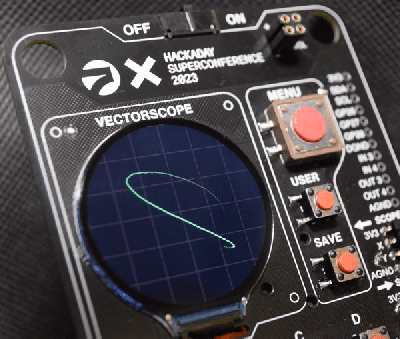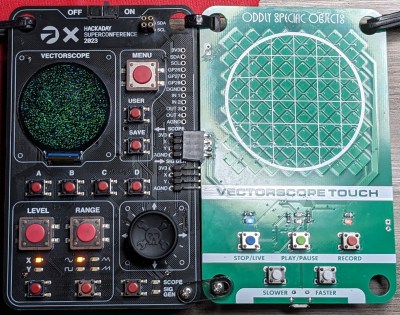Hackaday Europe 2024 is on! We’re all here in Berlin, and the talks are about to begin.
If you’re not, you can join us in spirit on our livestream! And if you’re following along, drop comments here.
Hackaday Europe 2024 is on! We’re all here in Berlin, and the talks are about to begin.
If you’re not, you can join us in spirit on our livestream! And if you’re following along, drop comments here.
By the time this post hits the front page, we’ll be just a few days away from the kickoff of Hackaday Europe 2024!
For those of you joining us in Berlin this weekend, we’ve got an incredible amount of content planned for you. Things get rolling on Friday with a pre-event meetup. But Saturday is when things really kick into high gear. Before the day’s out, we’ll have played host to nearly a dozen speakers and — literally — more workshops than we could fit into the schedule. Two workshops will be “floating” events that will happen once enough interested parties have congregated in one place. We’ll keep things going until well past midnight, which leads directly into Sunday. We want to get a few sessions of lightning talks packed in, so start coming up with your talk ideas now.

In addition, there will be food, music, camaraderie, badge hacking, and the general technolust surrounding a Hackaday event. In our humble and totally unbiased opinion, we put on some of the best and most unique hardware hacking meetups in the world — if you like reading Hackaday, you’ll love living it for a couple of days.
As of this writing, we still have a very few tickets for Hackaday Europe 2024 available. Want one? Head over to the Eventbrite page. But you better hurry. We’re talking a literal handful here, so don’t be surprised if they’ve dried up by the time you read this.
The workshops have all sold out, but as usual, we’ll be running a waiting list right up until the last minute: should anyone have to drop out of a workshop (which happens more than you might think), their spot will go to the person next in line. If you’d like to get on the list, email prize@hackaday.com with your name, ticket number, and the workshop you’re hoping to sneak into, and we’ll see what we can do.
But don’t let the workshops stop you. There’s still plenty to see, do, and experience. See you there!
Hacker Hotel is a small Dutch hacker event that takes place, as its name suggests, in a hotel. It’s a welcome high point in the damp of a north-west-European winter, and attendees come to its setting in the wooded Veluwe region in the centre of the country from far and wide. As is the custom with such events it has an electronic badge, and this year’s one had a rather unusual interface. Instead of a keyboard for text input, it replicates a 19th century Crook and Wheatstone telegraph, replacing the five needles of the original with a diamond-shaped grid of LEDs.
At its heart is an Espressif ESP32-C6 microcontroller which provides both a processor powerhouse and the usual array of wireless connectivity. Paired with that is a much more modest CH32V003 microcontroller to handle I/O tasks, and an e-paper screen using displays salvaged from surplus German supermarket shelf labels. That interface is handled by an array of five-way switches, and in a stroke of genius there’s a small relay on board which does nothing but provide a satisfying tactile “click”. Expansion is seen to by an SAO connector, Qwiic, and a USB-C socket. The software meanwhile is a combination of a non-volatile nametag, a complex set of puzzles used in the on-site competition, and a messaging system using the C6’s 802.15.4 mesh networking. A particularly neat feature of this was a Battleships game that could be played with another badge.
While this isn’t the first Hacker Hotel badge with an e-paper display, we like this one for its novel interface, for the mesh connectivity, and for that clicky relay. We’ll definitely be using ours as a name badge for some time to come.
There are only a few weeks left until Hackaday Europe takes place in Berlin on April 13th and 14th. With only one full day of programming, we simply can’t run as many workshops as we do at Supercon, but what we do have should tickle your fancy. As if that weren’t enough, there will be at least a few other impromptu workshops and activities to distract you from the talks.
If you’re thinking of attending, get your tickets now for both the event and the workshops of your choice. There are only a few left, and workshops sell out like hotcakes.
Continue reading “2024 Hackaday Europe: Workshops Announced, Get Your Tickets”
It’s a problem that faces every designer of an event badge: how to make something that won’t simply become a piece of e-waste once the last attendee has gone home. Various events have had badges with extra sensors, ones designed to be dev boards, and ones that try to do useful software tasks, but this year’s Electromagnetic Field in the UK has a different take. Its badge is designed to be used across multiple events, with the badge itself being a hub for event-specific add-ons.
To achieve this feat, the Tildagon badge is a hexagonal hub with an expansion port on every side. Each of these sports an edge connector, and the corresponding part of the add-on is simply part of the PCB. The ‘hexpansions’ as the add-ons are called, don’t even have to have electronics, at their simplest they can even be cut from a piece of card. The brain of the outfit is an ESP32-C3 sporting a round LCD. Of course, and it has the usual buttons and LEDs.
We applaud the sentiment behind making a badge live beyond the event, and we expect that this won’t be the only take on a reusable badge we’ll see over the coming events. We’re guessing those edge connectors will add to the BoM cost though, which is why this probably will be the first EMF badge for which there will be a modest charge. We look forward to seeing it for real, meanwhile, they also published some technical info alongside the announcement linked above.
Good news, procrastineers! A few folks asked us for a little more time to get their proposals together for our upcoming 2024 Hackaday Europe event in Berlin, and we’re listening. So now you’ve got an extra week – get your proposals for talks or workshops in before February 29th.

The badge is going to be a re-spin of the Supercon badge for all of you who couldn’t fly out to the US last November. There are no secrets anymore, so get your pre-hacks started now. We’ve seen some sweet all-analog hacks, some complete revisions of the entire firmware loadout, and, of course, all sorts of awesome hardware bodged onto it. Heck, we even saw Asteroids and DOOM. But we haven’t seen any native Jerobeam Fenderson-style oscilloscope music. You’ve got your homework.
A few other people have asked if they could bring in (art) projects to show and share. Of course! Depending on the scale, though, you may need to contact us beforehand. If it’s larger than a tower PC, get in touch with us, and we’ll work it out. Smaller hacks, projects in progress, and anything you want to bring along to show and inspire others with, are, of course, welcome without any strings attached.
What else might you need? A computer of your choice and a micro USB cable for programming the badge. There will be soldering stations, random parts, and someone will probably be able to lend you nearly any other piece of gear, so you can pack light if you want to. But you don’t have to.
If you’d like to attend but you don’t have tickets yet – get them soon! Space is limited, and we tend to sell out. Or better yet, submit a talk and sneak in the side door. We’d love to hear what you’ve got going on, and we can’t wait to see you all.
If you were to consider what the most important component of a hacker event might be, the chances are you’d pick something that’s part of the program, the ambiance, or the culture. But as the organizers of FOSDEM in Brussels found out, what’s really the most important part of such an event is the toilet paper.
If you can’t keep the supplies coming, you’re in trouble, and since they only had one key for the dispensers across the whole event, they were heading for a sticky situation. But this is a hacker event, and our community is resourceful. The folks on the FreeCAD booth created a model of the key which they shared via the Ondsel collaboration tools, while those on the Prusa booth fired up their Prusa XL and ran off a set of keys to keep the event well supplied.
Perhaps for many of us, the act of running off a 3D model and printing it is such a mundane task as to be unremarkable — and indeed the speed at which they were able to do it points to it being a straightforward task for them. But the sight of a bunch of hardware hackers saving the event by doing what they do best is still one to warm the cockles of our hearts. We’re fairly certain it’s not the first time we’ve seen a bit of clandestine venue hacking save an event, but perhaps for the sake of those involved, we’d better not go into it.